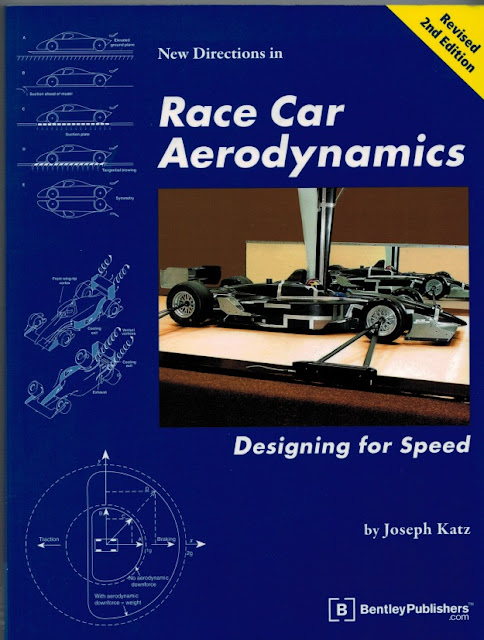For those of us interested in the
aerodynamics of racing cars, this book provides good explanations of
nearly all top-level aerodynamic theories.
Release Date: 09 March 2006
Pages: 270
ISBN: 08376 01428
The author Joseph Katz is a professor
at San Diego state University and during his career has been involved
in nearly all areas of motorsport from drag racing to formula one.
Over this time he has written a series of publications focusing
largely upon the aerodynamics of racing cars.
His book
Race Car Aerodynamics: Designing for Speed  is primarily written to cater for the larger
audience and hasn’t made any assumptions about the readers’ prior
theoretical knowledge. As such he starts each concept in a clear and
concise manner starting from and building upon the basic fundamentals
of aerodynamics. This approach allows for the book to be picked up by
anyone from the professional engineer to the hobbyist and does not
sacrifice content for either.
is primarily written to cater for the larger
audience and hasn’t made any assumptions about the readers’ prior
theoretical knowledge. As such he starts each concept in a clear and
concise manner starting from and building upon the basic fundamentals
of aerodynamics. This approach allows for the book to be picked up by
anyone from the professional engineer to the hobbyist and does not
sacrifice content for either.
Anyone who reads this book no matter
their level of knowledge will be able to gain a deeper understanding
of the background theory and concepts that guide all aerodynamicists
including wing theory.
The text and images contained in the book are all black and white (which has proved an issue for me in other publications where all the images have seemed to merge into unintelligible silhouettes) yet the lack of colours does not hinder the readers’ ability to clearly disconcern all aspects of each individual image.
The overall breakdown of chapters
within the book is good with individual topics explained fully and in
detail, this allows for a smooth transition between concepts lending
the book a nice flow through out avoiding confusion. Real life
examples are almost always given to further help reinforce ideas to
the practically minded reader.
The inclusion of a large variety of
images and examples also means that the text does not feel quite as
mathematically biased in this genre and as such it proves to be a
much easier read following more along the lines of a highly detailed
guide book opposed to a reference text.
The only small issue I have with this
book are that it hasn’t had a more recent update to cover later
Formula one examples as most of the information only covers up to
around 2004, This does not mean that the information contained within
is out of date as aerodynamics is more of an "evolutionary art
opposed to a revolutionary one".
Within the book the author has also
included greyed boxes containing formulas relevant to each specific
are. Each formula box is filled with clear explanations of how the
formulas are used, allowing for those with no previous experience to
grasp the underlying mathematics governing the use of each. Personally
I found these boxes especially useful.
Although aerodynamics is
heavily mathematically based, the general principles require no
mathematical knowledge yet it is always a good idea to understand
the maths behind the ideas.
Conclusion:
I really rate
this book highly and I
often find myself referring to it over some of my more analytical
books like
Understanding Aerodynamics by Doug McLean.
highly and I
often find myself referring to it over some of my more analytical
books like
Understanding Aerodynamics by Doug McLean. The way the
author always explains concepts in such a clear and concise manner is
especially welcome, which is helpful if like myself you are
a keen F1 fan and often find the televised explanations lacking and
need a quick reference just to suss out possible benefits of recent
changes. In this regard the book would make an excellent present for
any one interested in forms of racing.
The way the
author always explains concepts in such a clear and concise manner is
especially welcome, which is helpful if like myself you are
a keen F1 fan and often find the televised explanations lacking and
need a quick reference just to suss out possible benefits of recent
changes. In this regard the book would make an excellent present for
any one interested in forms of racing.
Although the book may fall slightly on
the basic side of degree level texts it is still more than advanced
enough for anyone interested in aerodynamics.
A study of this book before reading more advanced publications would
definitely help in achieving a greater base knowledge which can then
be expanded upon in sections without trying to learn everything at
once.
In all for anyone seeking more of an
insight into the aerodynamics of racing cars, this is a highly
recommended book.





ReplyDeleteAmazing post with lots of usefull information. Well done!. Keep Posting check out similar website like this..
two way screwdrive